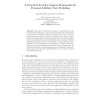1407 search results - page 78 / 282 » Learning Abstract Scheduling Models |
120
click to vote
DIMVA
2006
15 years 3 months ago
2006
Abstract. The Internet, and in particular the world-wide web, have become part of the everyday life of millions of people. With the growth of the web, the demand for on-line servic...
126
Voted
FMSD
2008
15 years 2 months ago
2008
Abstract Compositional reasoning aims to improve scalability of verification tools by reducing the original verification task into subproblems. The simplification is typically base...
FTCS
1998
15 years 3 months ago
1998
Abstract-- We propose a formal definition for the timed asynchronous distributed system model. We present extensive measurements of actual message and process scheduling delays and...
121
Voted
SOCO
2009
Springer
15 years 9 months ago
2009
Springer
Abstract. Non-functional requirements encompass important design concerns such as schedulability, security, and communication constraints. In model-based development they non-local...
102
Voted
UM
2007
Springer
15 years 8 months ago
2007
Springer
Abstract. This paper addresses the problem of capturing rich, longterm personal activity logs of users’ interactions with their workstations, for the purpose of deriving predicti...

